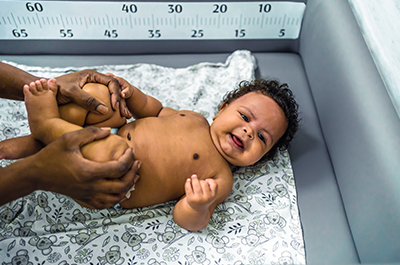“An ounce of prevention is worth a pound of cure.” That well-known adage speaks to a universal truth: taking precautions before a crisis occurs is preferable to treatment afterward. That is particularly true when dealing with potentially poisonous items in your home.
“Prevention is the best way to protect your child from accidental poisoning,” says Lindsay Drouillard, a pediatric nurse practitioner with Henry Ford Health.
Drouillard says that keeping medications and cleaning products out of reach and locked away at home, as well as at caregiver’s homes, is essential.
The American Association of Poison Control Centers (AAPCC) says children are especially sensitive to cleaning chemicals, commonly found in homes, schools and daycare facilities. Even if a particular substance doesn’t affect you, it doesn’t mean it won’t cause harm to children. Unsafe behaviors coupled with natural curiosity increase the chances of a child coming into contact with hazardous chemicals.
Drouillard adds that there are many common items that need to be treated as potentially poisonous as well.
“Make up, cleaning supplies, detergents and soaps for the dishwasher or laundry, toothpaste, medication, e-cigarette refills and batteries are a few common items that can be poisonous to children,” Drouillard says.
One danger is that these items are often left on counters within easy reach of children. “Toothpaste contains fluoride, which in high doses is toxic,” Drouillard cautions. “Children under 2 should use fluoride-free toothpaste and their parents’ toothpaste should be kept high and out of reach.”
What to Look for and What Do If You Suspect Poisoning
Symptoms of accidental poisoning vary depending on the product involved. Some typical symptoms include: breath that smells like chemicals, vomiting, difficulty breathing, drowsiness and confusion. Swallowing corrosive substances can produce burns or redness around the mouth.
A busy wife and mother of three, Drouillard recommends becoming familiar with and using the resources of the Poison Control Help Line – and call it if you suspect an accidental poisoning. Poison centers offer free, confidential, expert medical advice 24 hours a day, seven days a week through the Poison Help line at 800-222-1222 and online at PoisonHelp.org.
“Keep the number in your contacts,” Drouillard urges. “Never be afraid to call. The phone is always answered by a nurse or pharmacist. In many cases, a call can prevent a trip to the hospital.” She adds that Poison Control will ask questions about what substance is involved, so keep the product handy to check the ingredients.
However, she cautions, “If the child is unconscious or unresponsive, call 911.”
For an appointment with a Henry Ford pediatrician, visit henryford.com or call 1-800-HENRYFORD (436-7936).
Lindsay Drouillard, NP, is a nurse practitioner specializing in pediatrics and seeing patients at Henry Ford Hospital in Detroit.



